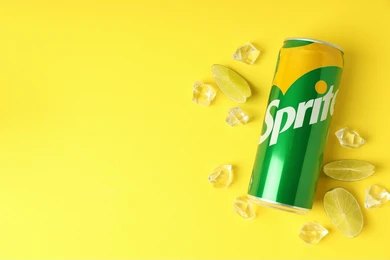Sprite, the beloved lemon-lime soda, has been a refreshing beverage choice for decades. Known for its crisp, citrusy flavor, it appeals to people of all ages. However, with growing awareness about diet and health, many consumers are increasingly scrutinizing the ingredients in their favorite drinks. One common question is, does Sprite contain aspartame?
Understanding what’s in your soda is essential, especially if you are health-conscious or have specific dietary restrictions. In this article, we’ll break down Sprite’s ingredients, its various versions, and the health implications of aspartame.
Does Sprite Contain Aspartame?
Aspartame is a widely used artificial sweetener known for its low-calorie content. It is commonly found in sugar-free and diet sodas, as it provides sweetness without adding sugar or calories. However, for those who wonder if regular Sprite contains aspartame, the answer is straightforward.
Regular Sprite and Aspartame
In the United States, regular Sprite does not contain aspartame. The Coca-Cola Company, which produces Sprite, uses high-fructose corn syrup or sugar as sweeteners for the classic version of this soda. This is an important distinction, as not all sodas are free from artificial sweeteners.
While regular Sprite remains aspartame-free, it’s crucial to examine its other variants, as some do incorporate artificial sweeteners, including aspartame. Let’s dive deeper into those.
Sprite Variants and Their Sweeteners
As the demand for sugar-free beverages has surged, the Coca-Cola Company has introduced multiple Sprite variants to cater to different consumer needs. These include low-calorie and sugar-free options.
Sprite Zero Sugar
Sprite Zero Sugar is the most popular sugar-free alternative to regular Sprite. It retains the iconic lemon-lime flavor but skips the sugar. However, Sprite Zero Sugar in the U.S. does contain aspartame, which is blended with another sweetener, acesulfame potassium (Ace-K). This combination enhances the sweetness while keeping the drink calorie-free.
Why Does Sprite Zero Sugar Use Aspartame?
Aspartame is 200 times sweeter than sugar, meaning only a small amount is needed to achieve the desired taste. This allows Sprite Zero Sugar to maintain its flavor profile without adding calories, making it a popular choice for people watching their sugar intake.
Other Sprite Variants
Globally, there are other Sprite variants that may have different formulations depending on regional preferences and regulations. For instance, in some countries, Sprite Lite or similar versions may use alternative sweeteners. Always check the label to confirm the ingredients if you are concerned about artificial sweeteners.
Health Considerations of Aspartame
Artificial sweeteners like aspartame are among the most scrutinized food additives. Understanding their safety and health implications is essential for making informed dietary choices.

Safety of Aspartame Consumption
Aspartame has been extensively studied and is approved for use by major health organizations, including the U.S. Food and Drug Administration (FDA), the European Food Safety Authority (EFSA), and the World Health Organization (WHO). These agencies confirm that aspartame is safe for general consumption when consumed within the acceptable daily intake (ADI) limits.
What is the Acceptable Daily Intake for Aspartame?
The ADI for aspartame is set at 50 milligrams per kilogram of body weight in the U.S. This amount is far higher than what an average person would consume, even if they regularly drink diet sodas.
Phenylketonuria (PKU) and Aspartame
One specific group that must avoid aspartame is individuals with Phenylketonuria (PKU). PKU is a rare genetic disorder that affects the body’s ability to metabolize phenylalanine, an amino acid present in aspartame. For these individuals, consuming aspartame can lead to severe health issues, including brain damage. As a result, products containing aspartame carry a warning label to inform consumers with PKU.
General Public Concerns
Despite its approval by health authorities, aspartame has faced public scrutiny due to concerns about its potential side effects. Some people worry that aspartame could be linked to headaches, digestive issues, or even more severe conditions like cancer. However, extensive scientific research has not found conclusive evidence to support these claims. The consensus among experts is that aspartame is safe for the vast majority of people when consumed in moderation.
Related to Read: Does Sprite Have Caffeine? A Complete Guide
Does Sprite Contain Aspartame?
Aspartame is a low-calorie artificial sweetener used in many diet and sugar-free products. It’s known for its sweetness, which is about 200 times stronger than sugar. This makes it a common choice in beverages marketed as calorie-free or low-calorie options.
Regular Sprite and Aspartame
For those who enjoy regular Sprite in the U.S., there’s good news: regular Sprite does not contain aspartame. The Coca-Cola Company sweetens this version with sugar or high-fructose corn syrup instead of artificial sweeteners. This makes regular Sprite a better option for those who wish to avoid aspartame but are less concerned about calorie content.
However, other Sprite variants use aspartame to maintain sweetness while cutting out sugar. Let’s explore these alternatives.
Sprite Variants and Their Sweeteners
Over the years, Sprite has introduced several versions of the soda to cater to various dietary preferences and restrictions. Some variants contain artificial sweeteners, including aspartame.
Sprite Zero Sugar
Sprite Zero Sugar is the sugar-free alternative to regular Sprite. It offers the same lemon-lime flavor but without added sugar. To achieve this, the Coca-Cola Company uses a combination of aspartame and acesulfame potassium (Ace-K) as sweeteners.
Why Choose Sprite Zero Sugar?
Sprite Zero Sugar is marketed toward individuals who are trying to reduce their calorie or sugar intake. For diabetics or those on low-sugar diets, it provides a soda option without causing significant blood sugar spikes. However, its use of artificial sweeteners like aspartame has raised concerns among some consumers, despite widespread safety approvals.
Other Sprite Variants
Beyond Sprite Zero Sugar, there are other international Sprite options with different formulations. For instance, some regions offer Sprite Lite or similar products, which may use aspartame, sucralose, or stevia. Always read ingredient labels to confirm which sweeteners are used in your local Sprite variant.
Health Considerations of Aspartame
Artificial sweeteners like aspartame are among the most researched food additives, yet they continue to be a topic of debate. Here’s a look at their safety and health implications.
Safety of Aspartame Consumption
Numerous global health authorities, including the FDA and WHO, have deemed aspartame safe for human consumption when used within recommended limits. The Acceptable Daily Intake (ADI) for aspartame is 50 milligrams per kilogram of body weight in the U.S., a threshold unlikely to be exceeded through normal consumption.
Is Aspartame Safe for Everyone?
Yes, for most people. However, individuals with certain medical conditions, such as PKU, must avoid aspartame due to its phenylalanine content.
Phenylketonuria (PKU) and Aspartame
Phenylketonuria (PKU) is a rare genetic disorder that prevents the proper metabolism of phenylalanine, an amino acid found in aspartame. For those with PKU, consuming aspartame can lead to severe complications, including neurological issues. To ensure safety, all products containing aspartame include a warning label for individuals with PKU.
General Public Concerns
Despite regulatory approvals, some consumers worry about aspartame’s potential side effects, including headaches, digestive discomfort, and even cancer. However, extensive scientific studies have found no conclusive evidence linking aspartame to these issues. Experts agree that moderate consumption of aspartame is safe for the general public.
Comparing Sweeteners in Soft Drinks
Sweeteners can be broadly categorized into natural and artificial options, each with its own benefits and drawbacks.

Artificial Sweeteners vs. Sugar
Artificial sweeteners like aspartame and natural sugar differ significantly in their health impacts. Sugar is a natural sweetener that provides calories and energy. However, excessive sugar consumption is linked to obesity, diabetes, and other metabolic disorders.
On the other hand, artificial sweeteners like aspartame are calorie-free and do not affect blood sugar levels. This makes them a popular choice for people managing weight or diabetes. However, concerns about their long-term effects continue to be studied.
Which is Better for You?
The answer depends on your health goals. If you’re reducing calorie intake, artificial sweeteners might be the better choice. If you’re looking for more natural options, sugar or plant-based sweeteners like stevia might be preferable.
Other Common Artificial Sweeteners
Apart from aspartame, many diet sodas use other artificial sweeteners, including:
- Sucralose: Commonly used in diet drinks, sucralose is about 600 times sweeter than sugar.
- Saccharin: One of the oldest artificial sweeteners, saccharin is calorie-free but has a slightly bitter aftertaste.
- Stevia: A plant-derived sweetener that is increasingly popular for its natural origin and low calorie count.
Each sweetener has unique properties, so it’s worth checking ingredient labels to find the one that suits your preferences.
Making Informed Beverage Choices
Choosing the right beverage can feel overwhelming, but a few simple steps can make the process easier.
Reading Ingredient Labels
Understanding what’s in your drink is the first step. Always check the ingredient label to see whether it contains sugar, aspartame, or other artificial sweeteners. Look for terms like “phenylalanine” if you’re avoiding aspartame.
Considering Health Goals
Your health goals should guide your choice. Are you trying to reduce calorie intake? Opt for sugar-free options but stay mindful of artificial sweeteners. If you prefer natural ingredients, choose beverages with sugar or stevia instead.
Conclusion
Sprite and its variants offer a variety of choices to suit different dietary needs. While regular Sprite does not contain aspartame, Sprite Zero Sugar uses this sweetener to maintain its flavor without adding calories. Aspartame is safe for the majority of people, but understanding its role and limitations is key to making informed decisions. By reading ingredient labels and considering your health goals, you can enjoy your favorite beverages while staying mindful of your dietary preferences.
Frequently Asked Questions
1. Does Diet Sprite Contain Aspartame?
Yes, Diet Sprite is marketed as Sprite Zero Sugar in the U.S. It contains a blend of aspartame and acesulfame potassium to provide sweetness without sugar or calories.
2. Are There Sprite Options Without Aspartame?
Yes, regular Sprite does not contain aspartame. Additionally, some international variants may use alternative sweeteners like stevia, so check the label for specific formulations.
3. How Does Aspartame Affect Blood Sugar Levels?
Aspartame does not affect blood sugar levels, making it a suitable option for people managing diabetes. However, it’s always best to consult a healthcare provider for personalized advice.
4. What Are the Health Risks of Aspartame?
For most people, aspartame is safe when consumed in moderation. However, individuals with PKU must avoid it due to their inability to process phenylalanine.
5. Can I Avoid Artificial Sweeteners Altogether?
Yes, by choosing beverages sweetened with natural sugars or alternatives like stevia, you can avoid artificial sweeteners entirely. Always read ingredient labels to confirm.

